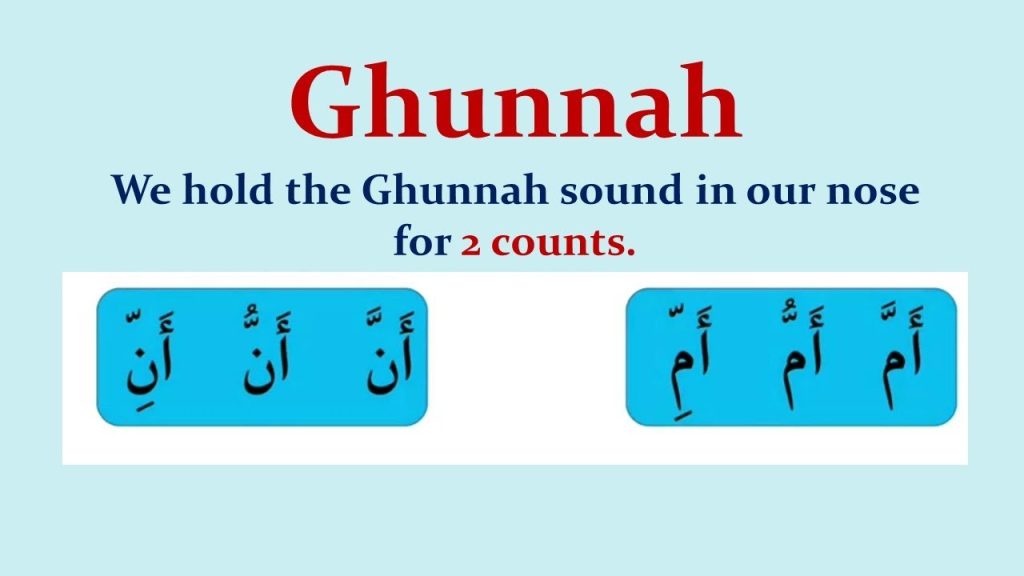
In the art of Quranic recitation, Tajweed serves as the guiding framework to ensure each letter and word is pronounced correctly, preserving the Quran’s divine melody and meaning. A pivotal aspect of Tajweed is Ghunnah, a nasalized sound that adds depth and authenticity to the recitation.
What is Ghunnah?
Ghunnah is a nasal sound produced during the articulation of specific Arabic letters, primarily Noon (ن) and Meem (م). This sound resonates in the nasal cavity, creating a humming effect without the involvement of the tongue or other oral articulators. Incorporating Ghunnah into recitation not only enhances its beauty but also ensures adherence to the phonetic nuances intended in the Quranic text.
The Letters of Ghunnah
The concept of Ghunnah is intrinsically linked to two Arabic letters:
- Noon (ن): Pronounced by touching the tip of the tongue to the roof of the mouth, allowing air to pass through the nasal passage.
- Meem (م): Articulated by bringing both lips together, directing the airflow through the nose.
Whenever these letters appear with a Sukoon (a diacritical mark indicating the absence of a vowel) or a Shaddah (a mark denoting the doubling of a consonant), they are pronounced with Ghunnah. This nasalization is a defining characteristic of their correct pronunciation in Quranic recitation.
Types of Ghunnah
Ghunnah manifests in varying degrees, each with specific rules and applications:
Most Complete Ghunnah (أكمل):
- Occurrence: When Noon or Meem carries a Shaddah, or during Idgham with Ghunnah (assimilation with nasalization).
- Duration: This form is held for the longest time, typically equivalent to two counts.
- Complete Ghunnah (كاملة):
- Occurrence: Found in scenarios like Ikhfaa’ Haqiqi (real concealment) and Ikhfaa’ Shafawee (lip concealment).
- Duration: Shorter than the most complete Ghunnah but still significant, usually held for two counts.
- Incomplete Ghunnah (ناقصة):
- Occurrence: Occurs when Noon or Meem is followed by a vowel or is pronounced clearly without assimilation.
- Duration: This is the shortest form, typically held for one count.
- Occurrence: Found in scenarios like Ikhfaa’ Haqiqi (real concealment) and Ikhfaa’ Shafawee (lip concealment).
- Most Incomplete Ghunnah (أنقص):
- Occurrence: Present when Noon or Meem carries a vowel marking.
- Duration: The briefest form, also held for one count.
- Occurrence: Present when Noon or Meem carries a vowel marking.
The subtle differences in these types of Ghunnah are crucial for accurate and melodious recitation, requiring attentive practice and guidance.
Rules for Implementing Ghunnah
Understanding when and how to apply Ghunnah is essential for proper Tajweed:
- Duration: Regular Ghunnah lasts for two counts. When accompanied by a Shaddah, the duration is extended, emphasizing the nasalization.
- Strength: The nasal sound should be clear and consistent, avoiding excessive nasalization or abruptness.
- Context: Ghunnah is applied in specific contexts, such as when Noon or Meem is followed by certain letters that dictate assimilation or concealment.
Common Mistakes to Avoid
To master Ghunnah and enhance your recitation:
- Insufficient Duration: Ensure that Ghunnah is held for the appropriate length, as specified by Tajweed rules.
- Over-Nasalization: Avoid making the nasal sound too pronounced or exaggerated, which can distort the intended pronunciation.
- Inconsistent Sound: Maintain a steady and uniform nasal tone throughout the recitation.
- Incorrect Placement: Be mindful of the letters that require Ghunnah and apply it only in the appropriate contexts.
Practical Tips for Mastery
Achieving proficiency in Ghunnah involves dedicated practice:
- Mirror Practice: Use a mirror to observe facial expressions and ensure correct articulation.
- Recording and Playback: Record your recitation and compare it with that of skilled reciters to identify areas for improvement.
- Counting Beats: Practice counting the duration of Ghunnah using your fingers or a metronome to internalize the timing.
- Group Learning: Join study groups or classes focused on Tajweed to receive feedback and support from peers and instructors.
The Importance of Proper Ghunnah
Mastering Ghunnah is vital for several reasons:
- Preservation of Meaning: Accurate pronunciation ensures the intended meanings of Quranic verses are conveyed without distortion.
- Aesthetic Enhancement: Proper Ghunnah adds a melodious quality to recitation, enhancing its beauty and emotional impact.
- Distinction Between Words: Correct application of Ghunnah helps differentiate between words that are similar in appearance but differ in meaning.
- Adherence to Tradition: Following the rules of Ghunnah maintains the authenticity of Quranic recitation as practiced by Prophet Muhammad (PBUH) and his companions.
Conclusion
Ghunnah is a fundamental component of Tajweed, enriching the Quranic recitation with its distinctive nasal tones. Understanding its types, rules, and applications is essential for anyone seeking to recite the Quran with precision and beauty. Through dedicated practice and adherence to Tajweed principles, one can master Ghunnah, elevating their recitation to a level that honors the sacredness of the Quranic text.
FAQs
What is Ghunnah in Tajweed?
Ghunnah is a nasal sound produced when pronouncing the Arabic letters Noon (ن) and Meem (م), characterized by airflow through the nasal passage without involving the tongue.
When is Ghunnah applied in Quranic recitation?
Ghunnah is applied when Noon Sakinah (نْ) or Tanween is followed by specific letters (ي، ر، م، ل، و، ن) in Idgham with Ghunnah, or when Meem Sakinah (مْ) is followed by another Meem, resulting in nasalization.
How is Ghunnah pronounced correctly?
To pronounce Ghunnah correctly, articulate Noon by touching the tongue to the roof of the mouth just behind the teeth, and Meem by bringing both lips together, ensuring the nasal sound is clear without excessive nasalization.
What are common mistakes to avoid when applying Ghunnah?
Common mistakes include insufficient duration (not holding the Ghunnah for the required time), over-nasalization (exaggerating the nasal sound), irregular sound (inconsistent nasal tone), and incorrect placement (applying Ghunnah where it’s not required or vice versa).
Why is mastering Ghunnah important in Quranic recitation?
Mastering Ghunnah ensures accurate pronunciation, preserves the intended meanings of Quranic verses, enhances the aesthetic quality of recitation, and maintains the traditional methods practiced by Prophet Muhammad (PBUH) and his companions.
